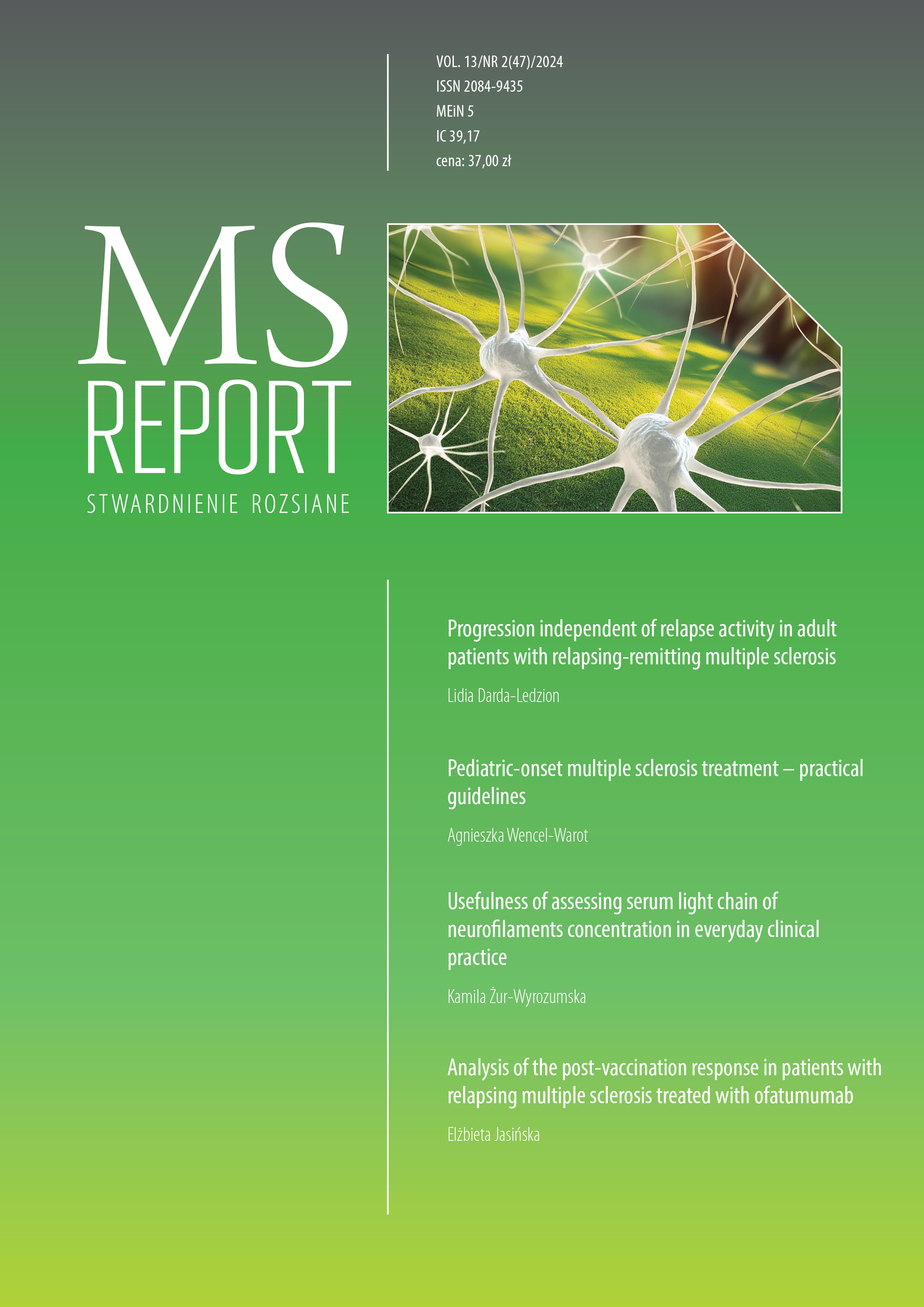Usefulness of assessing serum light chain of neurofilaments concentration in everyday clinical practice Review article
Main Article Content
Abstract
Neurofilaments are components of the cytoskeleton, and an increase in their concentration measured in blood serum is an indicator of neuroaxonal damage. As a result, they are a marker of damage to the central nervous system. Their particular importance is currently being studied in many neurological diseases, in multiple sclerosis, amyotrophic lateral sclerosis or brain injuries. In multiple sclerosis, serum neurofilament light-chain levels are considered as a predictor of short-term disease progression, long-term disease progression, and as a biomarker of response to disease-modifying therapy. Since neurofilaments are a tissue-specific marker and their growth reflects the loss of neurons in real time, they appear to be a simple and useful tool for assessing disease activity.
Article Details
Copyright © by Medical Education. All rights reserved.
References
2.Oset M, Domowicz M, Wildner P et al. Predictive value of brain atrophy, serum biomarkers and information processing speed for early disease progression in multiple sclerosis. Front Neurol. 2023; 14: 1223220. http://doi.org/10.3389/fneur.2023.1223220.
3. Abdelhak A, Petermeier F, Benkert P et al. Serum neurofilament light chain reference database for individual application in paediatric care: a retrospective modelling and validation study. Lancet Neurol. 2023; 22(9): 826-33. http://doi.org/10.1016/S1474-4422(23)00210-7.
4. Monreal E, Fernández-Velasco JI, García-Sánchez MI et al. Association of Serum Neurofilament Light Chain Levels at Disease Onset With Disability Worsening in Patients With a First Demyelinating Multiple Sclerosis Event Not Treated With High-Efficacy Drugs. JAMA Neurol. 2023; 80(4): 397-403. http://doi.org/10.1001/jamaneurol.2023.0010.
5.Arroyo Pereiro P, Muñoz-Vendrell A, León Moreno I et al. Baseline serum neurofilament light chain levels differentiate aggressive from benign forms of relapsing-remitting multiple sclerosis: a 20-year follow-up cohort. J Neurol. 2024; 271(4): 1599-609. .
6. Bar-Or A, Thanei GA, Harp C et al. Blood neurofilament light levels predict non-relapsing progression following anti-CD20 therapy in relapsing and primary progressive multiple sclerosis: findings from the ocrelizumab randomised, double-blind phase 3 clinical trials. EBioMedicine. 2023; 93: 104662. http://doi.org/10.1016/j.ebiom.2023.104662.
7.Fissolo N, Benkert P, Sastre-Garriga J et al. Serum biomarker levels predict disability progression in patients with primary progressive multiple sclerosis. J Neurol Neurosurg Psychiatry. 2024; 95(5): 410-8. http://doi.org/10.1136/jnnp-2023-332251.
8. Williams T, Zetterberg H, Chataway J. Neurofilaments in progressive multiple sclerosis: a systematic review. J Neurol. 2021; 268(9): 3212-22. http://doi.org/10.1007/s00415-020-09917-x.
9. van Dam M, de Jong BA, Willemse EAJ et al. A multimodal marker for cognitive functioning in multiple sclerosis: the role of NfL, GFAP and conventional MRI in predicting cognitive functioning in a prospective clinical cohort. J Neurol. 2023; 270(8): 3851-61. http://doi.org/10.1007/s00415-023-11676-4.
10. Valentino P, Malucchi S, Bava CI et al. Serum Neurofilaments are a reliable biomarker to early detect PML in Multiple Sclerosis patients. Mult Scler Relat Disord. 2023; 77: 104893. http://doi.org/10.1016/j.msard.2023.104893.
11. Oh U, Woolbright E, Lehner-Gulotta D et al. Serum neurofilament light chain in relapsing multiple sclerosis patients on a ketogenic diet. Mult Scler Relat Disord. 2023; 73: 104670. http://doi.org/10.1016/j.msard.2023.104670.
12. Kuhle J, Kappos L, Cross AH et al. Baseline serum neurofilament light levels have prognostic value for on-study MRI activity: Results from ASCLEPIOS trials; P0033. Zaprezentowano podczas kongresu ACTRIMS-ECTRIMS 11–13.09.2020 r.
13. Prado G, Kappos L, Cross AH et al. Ofatumumab Reduces Clinical and Radiological Activity in People With Recently Diagnosed Treatment-Naive Relapsing Multiple Sclerosis Irrespective of Baseline Serum Neurofilament Light Chain Levels; P9.008. Zaprezentowano podczas kongresu ACTRIMS 29.02–2.03.2024.
14. Leist T, Hauser S, Derfuss T et al. Prognostic Value of On-Treatment Serum Neurofilament Light Chain for New or Enlarging T2 Lesions in People With\ Relapsing Multiple Sclerosis: Pooled Analysis of the ASCLEPIOS I/II Trials; P032. Zaprezentowano podczas kongresu ACTRIMS 29.02–2.03.2024.
15. Cross A, Ziemssen T, Arnold D T et al. Prognostic Value of Serum Neurofilament Light Chain for Disease Activity in Patients With Relapsing Multiple Sclerosis: Results From Subgroup Analysis Based on Body Mass Index and Age From the Phase 3 ASCLEPIOS I/II Trials; P6.011. Zaprezentowano podczas kongresu ACTRIMS 29.02–2.03.2024.
16. Freeman J, Delgado S, Alvarez E et al. Baseline Serum Neurofilament Light Chain Levels Predict Future Disease Activity Irrespective of Race/Ethnicity: Results From the Phase 3 ASCLEPIOS I/II Trials; P9.006. Zaprezentowano podczas kongresu ACTRIMS 29.02–2.03.2024.
17. Delegado S, Alvarez E, Delgado S et al. Baseline Serum Neurofilament Light Chain Levels Predict Future Disease Activity Irrespective of Race/Ethnicity: Results From the Phase 3 ASCLEPIOS I/II Trials; P036. Zaprezentowano podczas kongresu ACTRIMS 29.02–2.03.2024.
18. Akgün IK, Schulze-Topphoff U, Shuh K et al. A Prospective Data Collection to Evaluate Utility and Added Value of Serum NfL in Multiple Sclerosis – First Interim Insights from NeofiLos; P033. Zaprezentowano podczas kongresu ACTRIMS 29.02–2.03.2024.
19. Sotirchos ES, Hu C, Smith MD et al. Agreement Between Published Reference Resources for Neurofilament Light Chain Levels in People With Multiple Sclerosis. Neurology. 2023; 101(23): e2448-e2453. http://doi.org/10.1212/WNL.0000000000207957.

